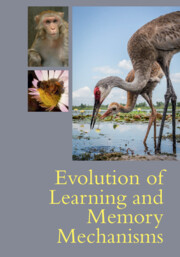Book contents
- Evolution of Learning and Memory Mechanisms
- Evolution of Learning and Memory Mechanisms
- Copyright page
- Contents
- Figures
- Tables
- Contributors
- Preface
- Introduction
- Part I Evolution of Learning Processes
- Part II Evolution of Memory Processes
- 16 The Evolution of Memory as an Immediate Perceptual Identification Mechanism
- 17 Episodic Memory in Animals
- 18 Evolutionary Origins of Complex Cognition
- 19 Evolution of Memory Systems in Animals
- 20 What Laboratory and Field Approaches Bring to Bear for Understanding the Evolution of Ursid Cognition
- 21 Distinguishing Mechanisms of Behavioral Inhibition and Self-control
- 22 Metacognitive Monitoring and Control in Monkeys
- 23 Adaptive Memory
- 24 Remembering Cheaters
- 25 Development of Memory Circuits under Epigenetic Regulation
- 26 Constraints on Learning and Memory
- Index
- References
19 - Evolution of Memory Systems in Animals
from Part II - Evolution of Memory Processes
Published online by Cambridge University Press: 26 May 2022
- Evolution of Learning and Memory Mechanisms
- Evolution of Learning and Memory Mechanisms
- Copyright page
- Contents
- Figures
- Tables
- Contributors
- Preface
- Introduction
- Part I Evolution of Learning Processes
- Part II Evolution of Memory Processes
- 16 The Evolution of Memory as an Immediate Perceptual Identification Mechanism
- 17 Episodic Memory in Animals
- 18 Evolutionary Origins of Complex Cognition
- 19 Evolution of Memory Systems in Animals
- 20 What Laboratory and Field Approaches Bring to Bear for Understanding the Evolution of Ursid Cognition
- 21 Distinguishing Mechanisms of Behavioral Inhibition and Self-control
- 22 Metacognitive Monitoring and Control in Monkeys
- 23 Adaptive Memory
- 24 Remembering Cheaters
- 25 Development of Memory Circuits under Epigenetic Regulation
- 26 Constraints on Learning and Memory
- Index
- References
Summary
Memory provides information for decision making and determines partly what animals can and cannot do. Here we categorize memory systems in animals in terms of their generality and their temporal characteristics, and we explore how evolution has tailored memory systems, considering both the benefits of having access to information and the costs of acquiring and remembering information. General associative memories are flexible and can last for years. In contrast, general short-term memories decay rapidly. We find no evidence of general memory systems used to store sequences of stimuli faithfully. Importantly, seeming limitations of general memory systems may be adaptive as they minimize storage and learning costs. In addition to general memory systems, animals have evolved specialized memories when they need more faithful or longer-lasting memories than afforded by general memory systems. We discuss the consequences of these findings for animal cognition research.
Keywords
- Type
- Chapter
- Information
- Evolution of Learning and Memory Mechanisms , pp. 339 - 358Publisher: Cambridge University PressPrint publication year: 2022
References
- 2
- Cited by

